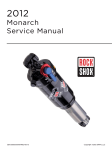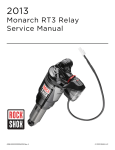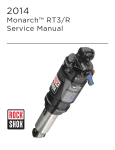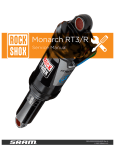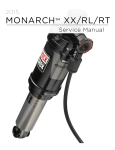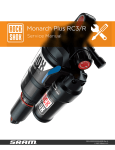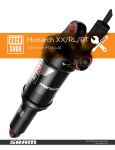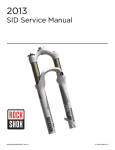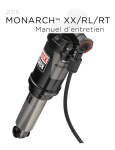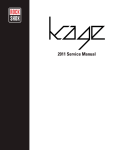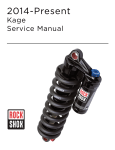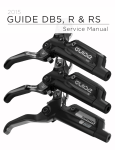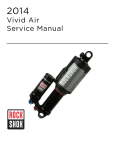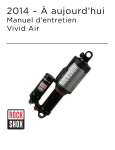Download Monarch Service Manual
Transcript
2012 Monarch Service Manual GEN.0000000004162 Copyright ©2011 SRAM, LLC SRAM LLC Warranty Extent of Limited Warranty SRAM warrants its products to be free from defects in materials or workmanship for a period of two years after original purchase. This warranty only applies to the original owner and is not transferable. Claims under this warranty must be made through the retailer where the bicycle or the SRAM component was purchased. Original proof of purchase is required. Local law This warranty statement gives the customer specific legal rights. The customer may also have other rights which vary from state to state (USA), from province to province (Canada), and from country to country elsewhere in the world. To the extent that this warranty statement is inconsistent with the local law, this warranty shall be deemed modified to be consistent with such law, under such local law, certain disclaimers and limitations of this warranty statement may apply to the customer. For example, some states in the United States of America, as well as some governments outside of the United States (including provinces in Canada) may: a. Preclude the disclaimers and limitations of this warranty statement from limiting the statutory rights of the consumer (e.g. United Kingdom). b. Otherwise restrict the ability of a manufacturer to enforce such disclaimers or limitations. Limitations of Liability To the extent allowed by local law, except for the obligations specifically set forth in this warranty statement, in no event shall SRAM or its third party supplies be liable for direct, indirect, special, incidental, or consequential damages. Limitations of Warranty This warranty does not apply to products that have been incorrectly installed and/or adjusted according to the respective SRAM technical installation manual. The SRAM installation manuals can be found online at sram.com, rockshox.com, avidbike.com, truvativ.com, zipp.com, or quarq.com. This warranty does not apply to damage to the product caused by a crash, impact, abuse of the product, non-compliance with manufacturers specifications of usage or any other circumstances in which the product has been subjected to forces or loads beyond its design. This warranty does not apply when the product has been modified. This warranty does not apply when the serial number or production code has been deliberately altered, defaced or removed. This warranty does not apply to normal wear and tear. Wear and tear parts are subject to damage as a result of normal use, failure to service according to SRAM recommendations and/or riding or installation in conditions or applications other than recommended. Wear and tear parts are identified as: •Dust seals •Bushings •Air sealing o-rings •Glide rings •Rubber moving parts •Foam rings •Rear shock mounting hardware and main seals •Upper tubes (stanchions) •Stripped threads/bolts (aluminium, titanium, magnesium or steel) •Brake sleeves •Brake pads •Chains •Sprockets •Cassettes •Shifter and brake cables (inner and outer) •Handlebar grips •Shifter grips •Jockey wheels •Disc brake rotors •Wheel braking surfaces •Bottomout pads •Bearings •Bearing races •Pawls •Transmission gears •Spokes •Free hubs •Aero bar pads •Corrosion •Tools •Batteries This warranty shall not cover damages caused by the use of parts of different manufacturers. This warranty shall not cover damages caused by the use of parts that are not compatible, suitable and/or authorised by SRAM for use with SRAM components. This warranty shall not cover damages resulting from commercial (rental) use. This publication includes trademarks and registered trademarks of SRAM LLC designated by the symbols ™ and ®, respectively. Product names used in this publication may be trademarks or registered trademarks of others. Table of Contents exploded view - monarch rear shock assembly................................................................................................... 4 RockShox suspension Service......................................................................................................................................... 5 XLOC removal........................................................................................................................................................................... 5 Mounting hardware and bushing service................................................................................................................ 6 Parts and tools needed for service.........................................................................................................................................................6 Mounting hardware removal........................................................................................................................................................................6 Eyelet Bushing replacement..........................................................................................................................................................................8 Mounting hardware installation.............................................................................................................................................................10 monarch service...................................................................................................................................................................12 parts and tools needed for service....................................................................................................................................................... 12 Air can service....................................................................................................................................................................................................... 12 damper body service.......................................................................................................................................................................................... 19 Piston service - Monarch R, RT, RT3........................................................................................................................................................... 22 Piston service - Monarch XX......................................................................................................................................................................... 25 IFP and damper body service........................................................................................................................................................................ 30 Shock assembly and bleed - Monarch R, RT, RT3............................................................................................................................... 32 Shock assembly and bleed - Monarch XX............................................................................................................................................. 35 Air can installation.......................................................................................................................................................................................... 38 XLOC installation............................................................................................................................................................... 40 Xloc Hose shortening/replacement......................................................................................................................... 41 Parts and tools needed for service....................................................................................................................................................... 41 Hose shortening................................................................................................................................................................................................... 41 Hose Replacement............................................................................................................................................................................................... 45 XLoc Bleed Procedure......................................................................................................................................................50 Parts and tools needed for service...................................................................................................................................................... 50 Bleed procedure.................................................................................................................................................................................................. 50 SAFETY FIRST! We care about YOU. Please, always wear your safety glasses and protective gloves when servicing RockShox products. Protect yourself! Wear your safety gear! e x p l o d e d v i ew - m o n arc h rear s h o c k assem b l y L A B Monarch RT M N C P D E Monarch XX F Q G R H O I High volume air can S J K A. B. C. D. E. F. G. H. I. J. 4 Shaft eyelet Air can valve Shaft Seal head/air piston Main piston IFP (Internal Floating Piston) Damper body Damper body eyelet Bottom out bumper Air can K. L. M. N. O. P. Q. R. S. Sag indicator o-ring Rebound adjuster Air can valve cap Compression lever (RC3 only) Damper air fill port cap Threshold adjuster (RT only) Remote hose boot (XX only) Remote hose (XX only) High volume air can sleeve exploded view - monarch rear shock assembly R o c k S h o x s u s p e n s i o n S er v i ce We recommend that you have your RockShox suspension serviced by a qualified bicycle mechanic. Servicing RockShox suspension requires knowledge of suspension components as well as the special tools and fluids used for service. For exploded diagram and part number information, please refer to the Spare Parts Catalog available on our web site at sram.com. For order information, please contact your local SRAM distributor or dealer. Information contained in this publication is subject to change at any time without prior notice. For the latest technical information, please visit our website at sram.com. Your product‘s appearance may differ from the pictures/diagrams contained in this publication. X L O C rem o v al When servicing Monarch XX rear shocks, it is necesary to remove the XLoc remote from the handlebar. 1 Use a T25 TORX® wrench to unthread the shifter mounting bolt and remove the shifter. T25 2 Use a T25 TORX wrench to loosen and remove the XLoc handlebar clamp bolt. Remove the XLoc from the handlebar. T25 5 RockShox suspension Service M o u n t i n g h ar d ware a n d b u s h i n g ser v i ce Prior to servicing your rear shock, you will first need to remove it from your bicycle frame according to your bicycle manufacturer's instructions. Once your shock is removed from your bicycle, you will need to remove the mounting hardware before performing any service. Notic e When you clamp the rear shock eyelets into a vise, use aluminum soft jaws to prevent damage to the eyelets. Parts a n d t o o ls n ee d e d f o r ser v i ce • Safety glasses • Bench vise with aluminum soft jaws • Nitrile gloves • SRAM rear shock bushing removal/installation tool • Apron • Adjustable wrench • Clean, lint-free rags • 13 mm open end wrench • Suspension specific grease M o u n t i n g h ar d ware rem o v al Some mounting hardware is easily removed using only your fingers. Try to remove the end spacers with your fingernail, then push the bushing pin out of the bushing. If this works, move on to the next section, Eyelet Bushing Replacement. If you are unable to remove your mounting hardware using your fingers, use the SRAM rear shock bushing installation/removal tool. Images in the following steps are of Vivid Air, but are applicable to Monarch. Push pin Catcher Threaded rod Rear shock bushing installation/removal tool 1 6 Thread the small end of the push pin onto the threaded rod until the push pin is flush or slightly protrudes from the hex-shaped end of the push pin. Mounting hardware and bushing service 2 Insert the threaded rod through the shock eyelet until the push pin rests against the bushing pin. Thread the large, open end of the catcher along the rod until it rests on the end spacer. 3 Clamp the catcher in a vise or hold it secure with a 13 mm open end or adjustable wrench. Use a second 13 mm wrench to thread the push pin along the rod until it stops against the end spacer. Unthread the push pin from the threaded rod and remove the end spacer from that side. 4 13 mm 13 mm 13 mm 13 mm Reinstall the push pin onto the threaded rod and hand thread it along the rod until it rests against the bushing pin (inside the shock eyelet bushing) again. Use a 13 mm wrench to thread the push pin along the rod until it stops against the shock eyelet. 5 Unthread the catcher from the threaded rod. Remove the end spacer from the threaded rod and the bushing pin from the catcher. Remove the push pin and threaded rod from the shock. Set the mounting hardware aside until you have finished servicing your shock. End spacer Repeat for the other eyelet. Bushing pin End spacer 7 Mounting hardware and bushing service E y elet B u s h i n g re p laceme n t To replace damaged or worn out bushings, use the RockShox rear shock bushing installation and removal tool. 1 Insert the threaded rod through the shock eyelet until the base of the push pin rests against the bushing. Thread the large, open end of the catcher onto the rod until it rests on the shock eyelet. 2 Clamp the catcher in a vise or hold it secure with a 13 mm wrench. Use a second 13 mm wrench to thread the push pin along the rod until the push pin rests against the shock eyelet. 13 mm 3 13 mm Unthread the catcher from the threaded rod. Remove the tool from the shock eyelet and discard the old bushing. Repeat for the other eyelet. 4 8 Apply a small amount of grease to the outside of the new bushing. Mounting hardware and bushing service 5 Position the shock eyelet and bushing between the soft jaws of a vise. Slowly turn the vise handle to begin pressing the bushing into the damper body. To prevent damage to the shock, position the eyelet in the vise so that the adjustment knobs are clear of the vise jaws. Check the alignment of the bushing as it enters the eyelet. If the bushing starts to enter the eyelet at an angle, remove the bushing from the eyelet, regrease the bushing, and repeat this step until the bushing enters the eyelet straight. 6 9 Continue to press the bushing until it is completely seated in the eyelet. Remove the shock from the vise and repeat the installation process for the other bushing and eyelet. Mounting hardware and bushing service M o u n t i n g h ar d ware i n stallat i o n Some mounting hardware is easily installed using only your fingers. Press the bushing pin into the shock eyelet bushing until the pin protrudes from both sides of the eyelet an equal amount. Then press an end spacer, large diameter side first, completely onto each end of the bushing pin. If this works, you have completed mounting hardware and bushing service. If you are unable to install your mounting hardware using your fingers, use the SRAM rear shock bushing installation and removal tool. 10 1 Thread the small end of the push pin onto the threaded rod until the push pin is flush or slightly protrudes from the hex-shaped end of the push pin. 2 Insert the threaded rod through the bushing pin then through the shock eyelet so that the bushing pin is positioned between the push pin and the shock eyelet. 3 Thread the large end of the catcher onto the rod from the opposite side of the shock eyelet until the rod rests against the shock eyelet. Mounting hardware and bushing service 4 Clamp the catcher in a vise or hold it secure with a 13 mm wrench. Use a second 13 mm wrench to thread the push pin along the rod until it pushes the bushing pin into the shock eyelet bushing. Continue to thread the push pin until the bushing pin protrudes from both sides of the eyelet an equal amount You may need to unthread the catcher slightly to check the bushing pin spacing. 13 mm 11 5 Unthread the catcher from the threaded rod and remove the tool from the shock eyelet. 6 Use your fingers to push an end spacer onto each end of the bushing pin, with the large diameter side of the spacers facing the shock eyelet. Mounting hardware and bushing service m o n arc h ser v i ce Prior to servicing your rear shock, you will first need to remove it from your bicycle frame according to your bicycle manufacturer's instructions. Once your shock is off your bicycle, be sure to remove the shock mount hardware (see the Mounting Hardware And Bushing Service section). p arts a n d t o o ls n ee d e d f o r ser v i ce • Safety glasses • Monarch XX vise block (Monarch XX) • Nitrile gloves • 13 and 17 mm open end wrench • Apron • Torque wrench • Clean, lint-free rags • 13 and 17 mm crowfoot • Oil pan • 1.5 and 2 mm hex wrenches • Isopropyl alcohol • Schrader valve tool • RockShox 7wt suspension fluid (Monarch R, RT, RT3) • RockShox 3wt suspension fluid (Monarch XX) • Suspension specific grease • Parker O-Lube • Maxima® Maxum4 Extra 15w 50 lube • Bench vise with aluminum soft jaws • Strap wrench • Needle nose pliers (Monarch XX) • Pick • Monarch air fill adapter • Shock pump • Metric caliper or small metric ruler sa f et y i n str u ct i o n s Always wear safety glasses and nitrile gloves when working with suspension fluid. Place an oil pan on the floor underneath the area where you will be working on the shock. A i r ca n ser v i ce 1 Turn the rebound adjuster counter-clockwise (toward the rabbit) until it stops. Turn the Gate lever (if applicable) to the unlocked position. Count each detent click as you turn the adjuster and record the number of clicks to assist with post-service set up. 12 monarch service 2 Check and record your current air pressure setting to assist with post-service set up. Remove the air valve cap. Use a small hex to depress the Schrader valve and release all air pressure from the air can. Use a Schrader valve tool to remove the valve core from the valve body. 3 Use a Schrader valve tool to remove the air/nitrogen port cap. Use a small hex wrench or pick to depress the Schrader valve and release all air/nitrogen pressure from the damper. Once the pressure has been released, depress the Schrader valve a second time. If the Schrader valve is able to move, the shock has been completely depressurized. If the Schrader valve does not move at all, the shock is still pressurized and will need to be sent to an authorized RockShox service center for further service. C a u t i o n - e y e Ha z ar d Verify all pressure is removed from the shock before proceeding. Failure to do so can cause the damper body to separate from the air can eyelet at a high velocity. 4 13 Use a Schrader valve tool to remove the valve core. monarch service 5 Clamp the shaft eyelet into a bench vise, with the shock positioned horizontally. To prevent damage to the shock use aluminum vise soft jaws and position the eyelet in the vise so that the adjustment knobs are clear of the vise jaws. 6 If the shock is collapsed so that a minimal amount of damper body is visible, there is still air pressure in the air can. Insert a rag through the damper body eyelet. This will prevent the air can from forcefully ejecting from the shock upon disassembly. C a u t i o n - e y e Ha z ar d Disassembly of a pressurized air can may cause suspension fluid or debris to forcefully eject from the shock. Wear safety glasses during shock service. 7 Use a strap wrench to remove the air can. Wrap the strap around the section of the air can furthest from the air can eyelet. Turn the wrench counter-clockwise to loosen and unthread the air can. Once it is completely unthreaded, slowly pull the air can along the shock damper body to remove it. Do not place the strap wrench on the air can decal. For high volume air cans, grip the lower portion of the can. Otherwise the high volume sleeve will rotate independent of the air can preventing the air can from unthreading. Vacuum pressure will increase as you pull the air can along the damper body, then suddenly release as the end of the can comes over the damper body eyelet. 8 Use your fingers to remove the outer o-ring located below the air can threads. Use a rag to wipe the threads clean, apply a small amount of Parker® O-Lube grease to the new o-ring, and install it. 14 monarch service 9 Use a pick to pierce the air can dust wiper seal and o-ring located inside the dust wiper seal gland. Push or pull to remove them, paying attention to the orientation of the dust wiper seal for reinstallation. Do not scoop or dig the seals out as this may damage the seal gland. your finger or a pick to pull or push the step bushing ring 10 Use out of the air can. Use a pick to remove the back-up ring from the air can. 11 Spray isopropyl alcohol inside the air can and wipe it with a clean rag. Remove a glove and use your finger to inspect the inside and outside of the air can for scratches, dents, or other surface deformations. Replace the air can if it is scratched or damaged. All air cans have a small dimple, as seen from the exterior of the can, that you should feel during inspection. This is normal. In addition, high volume air cans have small port hole to the high volume sleeve that you should feel. This is normal. 15 monarch service 12 Install the new step bushing ring, o-ring, back-up ring, and dust wiper seal. Orient the new step bushing ring, step side down. Install the step bushing ring by inserting one end into the air can, then pushing the remainder of the ring into the can, so that it rests on the bottom of the second deepest gland. Dust Wiper Seal Back-Up Ring O-Ring Step Bushing Ring 16 13 Apply a small amount of Parker® O-Lube grease to the air can o-ring. Install it into the second deepest gland, so that it rests on top of the step bushing. 14 Install the air can back-up ring into the same gland, so that it rests between the o-ring and the top of the gland. monarch service 15 Orient the new dust wiper seal step side up. Install it into the dust wiper seal gland at the top of the air can. 16 Spray isopropyl alcohol on the air can threads and eyelet body threads and wipe them with a clean rag. 17 Apply a small amount of Parker® O-Lube grease to the step bushing ring, o-ring, back-up ring, and dust wiper seal. Set the air can aside. 17 monarch service 18 For High Volume Air Cans Only: Remove the retention o-ring from the high volume sleeve. Firmly grip the high volume sleeve and slide it off of the air can. Use your fingers to remove the high volume sleeve o-rings, clean the seal glands, and apply Parker® O-Lube to the new seals, then reinstall. Spray isopropyl alcohol inside the high volume sleeve and wipe it with a clean, lint-free rag. Evenly spread just enough Parker O-Lube to make the inside of the sleeve slippery. This stops the o-rings from rolling as the sleeve slides over them. Slide the air sleeve onto the air can. Reinstall the high volume sleeve retention o-ring into the o-ring groove outside of the air can. 18 monarch service d am p er b o d y ser v i ce 1 Remove the top out bumper from the damper body and replace it with a new one. 2 Remove the shock from the vise. Turn the shock over and clamp the damper eyelet into the vise, so the shock is vertical. Use aluminum vise soft jaws to protect the shock eyelet when clamped. 3 Use a 2 mm hex to unthread and remove the bleed screw, located in the seal head/fixed air piston. The compression ball may float up through bleed hole, this is ok. Simply remove the ball from the bleed hole and discard it. You will be able to skip steps 6-7. 2 mm 19 monarch service 4 Use a 17 mm open end wrench to loosen and remove the shaft/piston assembly from the damper body. Fluid will spill from the damper body and/or shaft assembly. 5 Remove the damper body from the vise and pour the fluid into an oil pan. 6 Hold the air can eyelet with one hand, and push the seal head/ air piston toward the air can eyelet with your other hand to expose the bleed port on the underside of the seal head. Be careful not to pinch your fingers as you slide the seal head/air piston. 7 Use a pick or 1.5 mm hex wrench to push and remove the compression ball out of the backside of the seal head through the bleed port. Do not replace the compression ball at this time, you will do that later. Do not re-use the compression ball. 20 monarch service 21 8 Spray the entire shaft and piston assembly with isopropyl alcohol and wipe it with a clean rag. 9 Use a pick to remove the seal head/air piston seal and glide rings. Apply a small amount of grease to the new seal head/air piston seal and glide rings, and install them. monarch service P i st o n ser v i ce - M o n arc h R , R T , R T 3 1 Remove and replace the glide ring located on the main piston. 2 Spray isopropyl alcohol on the shaft assembly and shaft clamp, wipe it with a clean rag. 3 Use the SRAM shaft clamp tool to clamp the seal head/air piston into a vise with the piston positioned vertically. 4 Use a 10 mm wrench to unthread the piston nut. Remove the main piston assembly. Keep all the parts together and set aside. 10 mm 22 monarch service 5 Pull up on the seal head/air piston to remove it from the damper shaft. 6 Use a pick to remove the seal head/air piston o-ring, located in the interior of the seal head. Apply a small amount of Parker® O-Lube to the new o-ring and install it. When using a pick to remove o-rings, do not scratch the seal head/air piston. Scratches may cause fluid to leak. 7 Use a pick to remove the inner o-ring, located at the base of the threads in the seal head/air piston. Apply Parker O-Lube to the o-ring and install it. 8 23 Install the seal head/air piston onto the damper shaft with the seal head threads oriented upward. monarch service 9 Thread the main piston, by hand, onto the damper shaft. Use a torque wrench with a 10 mm socket to tighten it to 4.5 Nm (40 in-lb). 10 mm 10 Remove the shaft assembly from the vise and set it aside. 24 monarch service P i st o n ser v i ce - M o n arc h XX 25 1 Spray isopropyl alcohol on the shaft assembly and shaft clamp, wipe it with a clean rag. 2 Use the SRAM shaft clamp tool to clamp the seal head/air piston into a vise with the eyelet positioned vertically. 3 Use a 13 mm open end wrench to loosen the eyelet. 4 Remove the shaft assembly from the vise. Unthread the shaft from the eyelet by hand. monarch service 5 Remove the topout washer and o-ring from the shaft. 6 Pull on the seal head/air piston to remove it from the damper shaft. 7 Use a pick to remove the o-ring located in the interior of the seal head. Apply a small amount of Parker® O-Lube to the new o-ring and install it. 8 Use a pick to remove the inner o-ring, located at the base of the threads in the seal head/air piston. Apply Parker O-Lube to the o-ring and install it. 26 monarch service 9 Apply a liberal amount of Parker O-Lube® to the shaft threads. the seal head/air piston onto the damper shaft with the 10 Install seal head threads oriented downward. Gently rock the seal head back and forth in a circular motion as the inner o-ring moves over the shaft threads. 27 11 Use isopropyl alcohol and a rag to clean the grease from the shaft threads. 12 Install the topout o-ring and washer onto the shaft. monarch service 13 Apply a small amount of threadlock to the shaft threads. 14 Use isopropyl alcohol and a clean rag to clean the eyelet threads. 15 Turn the rebound adjuster counter-clockwise until it stops. Do not get any threadlock on the adjuster needle. Use a pair of needle nose pliers to pull up on the rebound inner sleeve until 1 mm of the smaller diameter step is visible. 1 mm 28 monarch service 16 Depress the remote actuator. 17 Use the SRAM shaft clamp tool to clamp the seal head/air piston into a vise with the eyelet positioned vertically. Thread the shaft into the eyelet by hand until it stops turning. Use a torque wrench with a 13 mm crow foot socket to tighten the eyelet to 4.6 N·m (40 in-lb). 13 mm 18 29 Remove the shaft assembly from the vise and set it aside. monarch service IFP a n d d am p er b o d y ser v i ce 30 1 Wrap a rag around the end of the damper body. Thread a shock pump with the Monarch air fill adapter installed onto it into the air fill port. Pump air into the damper body to force the IFP (Internal Floating Piston) out of the damper body, into the rag. 2 Spray isopropyl alcohol on the inside and outside of the damper body and wipe it with a clean rag. Remove a glove and use your finger to inspect the inside and outside of the damper body for scratches, dents, or other surface deformations. If any deformations are found, the damper body will need to be replaced. 3 Remove the IFP o-ring. Spray the IFP with isopropyl alcohol and wipe it with a clean rag. Apply a small amount of grease to the new o-ring and install it. monarch service 4 Insert the IFP into the damper body with the stepped side visible. Use a metric caliper or ruler to push the IFP to the depth specified in the table below. Measure the IFP depth from the lowest part of the IFP. Shock dimensions 31 IFP insertion depth 152x31 45 mm 165x38 50.6 mm 184x44 56.1 mm 190x51 61.7 mm 200x51 61.7 mm 200x57 67.2 mm 216x63 72.8 mm 222x66 75 mm monarch service S h o c k assem b l y a n d b lee d - M o n arc h R , R T , R T 3 1 Use a Schrader valve core tool to install the new Schrader valve into the damper body air fill port. 2 Clamp the damper body eyelet into the vise, so the damper body is vertical. Wrap a clean rag around the damper body. Use aluminum vise soft-jaws to protect the shock eyelet when clamped. 3 32 Pour new RockShox 7wt suspension fluid into the the damper body until it is level with the top of the damper body. Use your finger to remove any bubbles from the surface of the fluid. monarch service 4 Check that both the gate and the rebound adjusters are set to their minimum settings. Slide the seal head/air piston until it stops at the end of the damper shaft. 5 Install the seal head/air piston onto the damper body. While holding only the seal head/air piston, thread it completely onto the damper body. Fluid will be displaced out of the bleed port. Do not hold on to the shaft eyelet or damper shaft while inserting. It will move the piston/shaft assembly, causing too much fluid to displace out of the damper body. 6 Use a torque wrench with 17 mm crow foot to tighten the seal head/air piston to 28.2 N·m (250 in-lb). Install the crow foot onto the torque wrench at a 90° angle to the handle to ensure an accurate torque reading. 17 mm 7 33 28 N∙m (250 in-lb) Allow air bubbles to escape from the bleed port in the seal head. Insert the new compression ball into the bleed port. monarch service 8 Use a 2 mm hex to gently thread the bleed screw into the bleed port until you feel it touch the compression ball. Tighten the bleed screw an additional ½ turn. Notic e Tightening the bleed screw more than ½ turn can damage the compression ball, causing fluid to leak. 2 mm 9 Use a shock pump with the Monarch air fill adapter to pressurize the damper body to 17.2 bar (250 psi). Once you have pressurized the shock, remove the Monarch air fill adapter from the air fill port BEFORE removing it from the shock pump. Separating the pump from the adapter first will allow all of the air to escape from the shock. If you have the proper fill equipment, you may substitute air with nitrogen. 17.2 bar (250 psi) 10 Use a Schrader valve tool to reinstall the air fill port cap. 11 34 Remove the shock from the vise. Spray the damper assembly with isopropyl alcohol and wipe it with a clean rag. monarch service S h o c k assem b l y a n d b lee d - M o n arc h XX 1 Use a Schrader valve core tool to install the new Schrader valve into the damper body air fill port. 2 Place the damper body into the Monarch XX vise block, then clamp the vise block into the vise, with the damper body positioned vertically. Tighten the vise firmly enough so that the IFP cannot move in the damper body. Check this by using your finger to push on the IFP. If it does not move, the vise is tight enough. If it does move, remove the damper body from the vise, reset the IFP to the proper depth, then re-install it into the vise blocks and vise tight enough that the IFP cannot move. Wrap a clean rag around the damper body. Do not overtighten the vise so that the damper body gets crushed. 3 35 Pour new RockShox 3wt suspension fluid into the the damper body until it is level with the top of the damper body. Use your finger to remove any bubbles from the surface of the fluid. monarch service 4 Check that the rebound adjuster is set to the minimum setting (toward the rabbit). Depress the remote button to open the compression valve, located directly beneath the piston. Slide the seal head/air piston until it stops at the end of the damper shaft. 5 Install the seal head/air piston onto the damper body and thread it completely onto the damper body. Fluid will be displaced out of the bleed port. Do not hold on to the shaft eyelet or damper shaft while inserting. It will move the piston/shaft assembly, causing too much fluid to displace out of the damper body. 6 Use a torque wrench with 17 mm crow foot to tighten the seal head/air piston to 28 N·m (250 in-lb). Install the crow foot onto the torque wrench at a 90° angle to the handle to ensure an accurate torque reading. 17 mm 7 36 28 N∙m (250 in-lb) Insert the new compression ball into the bleed port. monarch service 8 Use a 2 mm hex to gently thread the bleed screw into the bleed port until you feel it touch the compression ball. Tighten the bleed screw an additional ½ turn. Notic e Tightening the bleed screw more than ½ turn can damage the compression ball, causing fluid to leak. 2 mm 9 Remove the shock and vise blocks from the vise. Use a shock pump with the Monarch air fill adapter to pressurize the damper body to 34.4 bar (500 psi). Once you have pressurized the shock, remove the Monarch air fill adapter from the air fill port BEFORE removing it from the shock pump. Separating the pump from the adapter first will allow all of the air to escape from the shock. If you have the proper fill equipment, you may substitute air with nitrogen. 34.4 bar (500 psi) 10 Use a Schrader valve tool to reinstall the air fill port cap. 11 37 Spray the damper assembly with isopropyl alcohol and wipe it with a clean rag. monarch service A i r ca n i n stallat i o n 1 Clamp the shaft eyelet into a bench vise, so the shock is horizontal. To prevent damage to the shock, use aluminum soft jaws to clamp the eyelet and position the shock so that the adjustment knobs are clear of the vise. 2 Position the threaded side of the air can over the damper body eyelet. Firmly press the air can onto the air piston and damper body until the air can is approximately 30 mm from the shaft eyelet threads. Pour/inject 0.2 mL of Maxima® Maxum4 Extra 15w 50 into the air can. Continue to press the air can onto the damper body until the air can threads and shaft eyelet threads make contact. Thread the air can clockwise into the shaft eyelet. Tighten the air can, by hand, into the shaft eyelet as tightly as possible. Ensure the outside of the air can is free from oil. This allows a better grip when tightening the air can onto the shaft eyelet. For high volume air cans, grip the lower portion of the can. Otherwise the high volume sleeve will rotate independent of the air can preventing tightening of the air can. 3 Remove the shock from the vise. Turn the shock over and clamp the damper eyelet into the vise, so the shock is vertical. Use aluminum vise soft-jaws to protect the shock eyelet when clamped. 38 monarch service 4 Use a strap wrench and a torque wrench with a 13 mm crow foot to tighten the air can to the air can eyelet to 17 N·m (150 in-lb). For high volume air cans, reinstall the high volume o-rings and sleeve. 13 mm 39 5 Use a Schrader valve tool to install a new valve core into the valve body. 6 Use a shock pump to inflate the shock to the desired air pressure, then install the valve cap. 7 Spray isopropyl alcohol on the entire shock and wipe it with a clean rag. 8 Reinstall the sag indicator o-ring and shock mounting hardware (see the Mounting Hardware And Bushing Service section). XX Remote removal 17 N∙m (150 in-lb) monarch service X L O C i n stallat i o n 1 2 40 Install the XLoc and brake lever to the handlebar. Position the XLoc to your desired position, then install the clamp bolt and tighten it to 5–6 N∙m (44–53 in-lb). T25 5–6 N∙m (44–53 in-lb) T25 2.8–3.4 N∙m (25–30 in-lb) Attach the XLoc shifter to the XLoc bracket with the shifter mounting bolt. Use a T25 TORX® to tighten the shifter mounting bolt to 2.8-3.4 N∙m (25-30 in-lb). XLOC installation Xl o c H o se s h o rte n i n g / re p laceme n t ca u t i o n The XLoc damper remote lockout uses a specific hydraulic hose that is compatible with the system’s suspension fluid. • Do NOT use hydraulic brake fluid or mineral oil in the XLoc system. Only use RockShox Reverb Hydraulic fluid. • Do NOT use hydraulic brake bleed tools to bleed the XLoc system. Only use the RockShox Reverb Hydraulic Bleed Kit. Parts a n d t o o ls n ee d e d f o r ser v i ce • Safety glasses • RockShox Reverb Hydraulic Bleed Kit • Nitrile Gloves • T10 TORX® • Oil pan • 8 mm flare nut wrench • Suspension specific grease • Torque wrench • Replacement XLoc hydraulic hose • 8 mm flare nut crowfoot • Hydraulic hose cutter or cable housing cutter sa f et y i n str u ct i o n s Always wear safety glasses and rubber gloves when working with suspension fluid. H o se s h o rte n i n g 1 Pull the hose boot away from the XLoc remote to access the compression nut. 2 Use an 8 mm flare nut wrench to unthread the compression nut. 8 mm 41 Xloc Hose shortening/replacement 3 Pull the hose from the XLoc. Fluid will drip from the hose. 4 Slide the compression nut down the hose and away from the end where you’ll be cutting. Determine where you need to cut the hose by holding it up to the XLoc in the position you like. Make sure to leave a gentle bend in the hose with enough length to freely turn the bars all the way from side to side. The groove in the XLoc nose marks the spot where you’ll cut the hose. Double-check this measurement because you can’t go back after you cut. Do not push the XLoc button lever while the hose is removed. Use a hydraulic hose cutter to cut the hose. 5 42 Apply grease to the compression fitting outer surfaces and compression nut threads. Xloc Hose shortening/replacement 6 While holding the hose firmly, use a T10 TORX® to thread the hose barb into the end of the hose until it bottoms out. T10 43 7 Slide a new compression fitting over the end of the hose and new hose barb. 8 Push the hose firmly into the XLoc until it stops. 9 While holding the hose in place, slide the compression fitting and compression nut against the XLoc. Xloc Hose shortening/replacement continuing to push the hose into the XLoc, use a torque 10 While wrench with an 8 mm flare nut crowfoot to tighten the compression nut to 5 N·m (47 in-lb). Do not release the hose until the compression nut is tightened to the proper torque value. 8 mm 11 Slide the hose boot back into place. Shortening the hose introduces air into the system. It is necessary to bleed the remote assembly for optimal performance. See “XLoc Bleed Procedure” for instructions. 44 Xloc Hose shortening/replacement H o se R e p laceme n t 1 To replace the hydraulic hose: Pull the hose boot away from the XLoc and the shock swivel fitting to access the compression nuts. 2 Use an 8 mm flare nut wrench to unthread the compression nuts from the XLoc and the shock swivel fitting. 3 Pull the hose from the XLoc and the shock. Discard the hose. 8 mm Do not push the XLoc button lever while the hose is removed. Fluid will drip from the hose. 45 Xloc Hose shortening/replacement 4 While holding the new hose firmly, use a T10 TORX® to thread the hose barb into one end of the hose until it bottoms out. T10 5 Slide the new boot, compression nut, and compression fitting over the end of the hose with the new hose barb. 6 Push the hose firmly into the shock swivel fitting until it stops. While holding the hose in place, slide the compression fitting and compression nut to the swivel fitting. 7 While continuing to push the hose into the shock, thread the compression nut into the swivel fitting. Use a torque wrench with an 8 mm flare nut crow foot to tighten the compression nut to 5 N·m (47 in-lb). Slide the boot back into place. Do not release the hose until the compression nut is tightened to the proper torque value. 8 mm 46 5 N·m (47 in-lb) Xloc Hose shortening/replacement 8 Determine where you need to cut the hose by holding it up to the XLoc in the position you like. Make sure to leave a gentle bend in the hose with enough length to freely turn the bars all the way from side to side. The groove in the XLoc nose marks the spot where you’ll cut the hose. Use a hydraulic hose cutter to cut the hose. 9 Apply grease to the compression fitting outer surfaces and compression nut threads. holding the hose firmly, use a T10 TORX® to thread the 10 While hose barb into the end of the hose until it is flush. T10 11 47 Slide the new boot, compression nut, and compression fitting over the end of the hose. Xloc Hose shortening/replacement 13 Push the hose firmly into the XLoc until it stops. holding the hose in place, slide the compression fitting 14 While and compression nut up to the XLoc. 15 While continuing to push the hose into the XLoc, use a torque wrench with an 8 mm flare nut crowfoot to tighten the compression nut to 5 N·m (47 in-lb). Do not release the hose until the compression nut is tightened to the proper torque value. 8 mm 48 5 N·m (47 in-lb) Xloc Hose shortening/replacement 16 Slide the hose boot into place. Shortening the hose introduces air into the system. It is necessary to bleed the remote assembly for optimal performance. See the next section, “XLoc Bleed Procedure” for instructions. 49 Xloc Hose shortening/replacement X L o c Blee d Pr o ce d u re Parts a n d t o o ls n ee d e d f o r ser v i ce • Safety glasses • Torque wrench • Nitrile Gloves • T25, T10 TORX® bit sockets • Replacement XLoc hydraulic hose • RockShox Reverb Hydraulic Fluid • T25, T10 TORX® wrenches • RockShox Reverb Hydraulic Bleed Kit sa f et y i n str u ct i o n s Always wear safety glasses and rubber gloves when working with suspension fluid. Blee d p r o ce d u re 1 Use a T25 TORX to unthread the shifter mounting bolt and remove the shifter. T25 2 Use a T25 TORX to loosen the XLoc handlebar clamp. Position the XLoc so that the bleed screw is at the highest point, then re-tighten the clamp bolt. Bleed screw T25 50 XLoc Bleed Procedure 3 Assemble two RockShox Reverb bleed syringes: 4 Fill both syringes with 10 mL of RockShox Reverb Hydraulic fluid. 5 Use a T10 TORX® to remove the bleed screw from the center of the rebound adjuster knob. Install the o-ring onto the end of the brass fitting. Insert the brass fitting into the plastic tube. Insert the red fitting into the other end of the plastic tube. Thread the red fitting into the syringe. T10 51 XLoc Bleed Procedure 6 Thread one of the syringes into the damper bleed port. 9 Use a T10 TORX® to remove the bleed screw from the XLoc. Thread the brass fitting of the other syringe into the bleed port. T10 both syringes upright. Depress the plunger of the damper 10 Hold syringe while gently pulling out on the plunger of the remote syringe. Reverse this process and repeat until no more bubbles move into the remote syringe. 52 XLoc Bleed Procedure 53 11 Unthread the syringe from the damper. Use a T10 TORX® to re-install the bleed screw into the damper. Use a rag to wipe off any excess suspension fluid. 12 Hold the XLoc button in the extended (locked) position and pull out the syringe plunger. Small bubbles will move into the suspension fluid as air is pulled from the system. 13 Continue pulling out on the syringe plunger. Push in the XLoc button to the unlocked position. This will dislodge more bubbles from the remote into the syringe. T10 XLoc Bleed Procedure the syringe plunger, then press in the XLoc button to 14 Depress release it to the locked position. 15 Repeat steps 12-14 until air bubbles no longer move into the suspension fluid. It can take several repetitions of this process to fully void the system of air. 16 Unthread the syringe fitting from the XLoc bleed port. Put a few drops of fluid into the bleed port. Install the bleed port screw and use a T10 TORX® to tighten it to 0.5–0.7 N∙m (4.5–6 in-lb). Use a rag to wipe off any excess suspension fluid. 17 Use a T25 TORX® to loosen the XLoc handlebar clamp. Re-position the XLoc to your desired position, then tighten the clamp bolt to 5–6 N∙m (44–53 in-lb). T10 0.5 – 0.7 N∙m (4.5 – 6.0 in-lb) T25 54 5–6 N∙m (44–53 in-lb) XLoc Bleed Procedure 18 Attach the XLoc shifter to the XLoc bracket with the shifter mounting bolt. Use a T25 TORX® to tighten the shifter mounting bolt to 2.8-3.4 N∙m (25-30 in-lb). T25 55 2.8–3.4 N∙m (25–30 in-lb) XLoc Bleed Procedure www.sram.com

























































